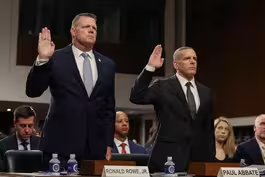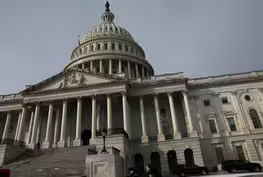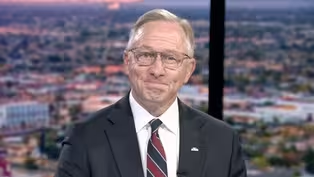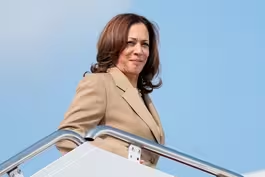
Israel targets Hezbollah leader in Beirut strike
Clip: 7/30/2024 | 8m 48sVideo has Closed Captions
Israel targets Hezbollah leader in Beirut strike, sparking new fears of escalation
Israel says it has killed one of Hezbollah’s most senior military officials in the southern suburbs of Beirut. Israel blames Fuad Shukr for this past weekend’s strike that killed a dozen children. His possible death is sparking fears of an escalating war in the region. Nick Schifrin discussed the developments with Randa Slim of the Middle East Institute.
Problems playing video? | Closed Captioning Feedback
Problems playing video? | Closed Captioning Feedback
Major corporate funding for the PBS News Hour is provided by BDO, BNSF, Consumer Cellular, American Cruise Lines, and Raymond James. Funding for the PBS NewsHour Weekend is provided by...

Israel targets Hezbollah leader in Beirut strike
Clip: 7/30/2024 | 8m 48sVideo has Closed Captions
Israel says it has killed one of Hezbollah’s most senior military officials in the southern suburbs of Beirut. Israel blames Fuad Shukr for this past weekend’s strike that killed a dozen children. His possible death is sparking fears of an escalating war in the region. Nick Schifrin discussed the developments with Randa Slim of the Middle East Institute.
Problems playing video? | Closed Captioning Feedback
How to Watch PBS News Hour
PBS News Hour is available to stream on pbs.org and the free PBS App, available on iPhone, Apple TV, Android TV, Android smartphones, Amazon Fire TV, Amazon Fire Tablet, Roku, Samsung Smart TV, and Vizio.
Providing Support for PBS.org
Learn Moreabout PBS online sponsorshipAMNA NAWAZ: Welcome to the "News Hour."
Israel says it has killed one of Hezbollah's most senior military officials in the southern suburbs of Beirut tonight.
Nick Schifrin is watching this and is here with us now -- Nick.
NICK SCHIFRIN: Geoff, U.S. officials have no independent confirmation of Fuad Shukr's death.
But Israel blames him for this past weekend strike that killed a dozen children and he's long been on the U.S.' most wanted list.
And, tonight, his possible death is sparking fears of an escalating regional war.
It was a strike in Hezbollah's stronghold.
An Israeli missile destroyed an apartment building and rained debris into the middle of a residential neighborhood, the target confirmed by an Israeli official, U.S. specially designated global terrorist Fuad Shukr, also known as al-Hajj Mohsin.
Israel held him -- quote -- "responsible" for last weekend's attack on a soccer field that killed a dozen children and teenagers, a strike that Israel's defense minister said today crossed a red line.
An Israeli official also called him the head of Hezbollah's military wing, one of Hezbollah leader Hassan Nasrallah's most senior military commanders.
But he's also a wanted man in the U.S. for playing a -- quote -- "central role" in the October 1983 bombing of the U.S. Marine court barracks in Beirut that killed 241 U.S. service members.
Vice President Harris said after arriving in Atlanta today she supported Israel and wants a diplomatic solution.
KAMALA HARRIS, Vice President of the United States (D) and U.S. Presidential Candidate: It has the right to defend itself against a terrorist organization, which is exactly what Hezbollah is.
But, all of that being said, we still must work on a diplomatic solution to end these attacks, and we will continue to do that work.
NICK SCHIFRIN: Senior American officials have visited Lebanon and Israel, hoping to calm tensions with the diplomatic agreement to move Hezbollah back from the Israeli border, as the U.N. Security Council long ago demanded.
But the two sides have traded fire for 10 months since Hezbollah started launching rockets on October the 8th.
And analysts say Hezbollah will consider the seniority and location of today's target requiring a response.
After the strike, residents of Southern Beirut demanded revenge.
Tonight, a senior Israeli official tells me that Israel wanted to send a -- quote -- "very clear message.
We will not tolerate harm to civilians, but we don't want to see this escalating into a wider war and whether it does is in the hands of Hezbollah."
To discuss today's attack, we turn to Randa Slim, the director of the Conflict Resolution and Track II Dialogues Program at the Middle East Institute.
Randa Slim, thanks very much.
Welcome back to the "News Hour."
How important was Fuad Shukr and what impact will his death have, assuming that he is in fact dead?
RANDA SLIM, Middle East Institute: Assuming he's dead, because Hezbollah until now has not confirmed his death.
He is a senior commander.
He's a member of Hezbollah's elite Jihadi Council, which is a group of -- small group of few men who are in charge of all military affairs of Hezbollah.
He is part of the first cohort of Hezbollah fighters in the early '80s, rose through the ranks to become a senior commander in and now a member of this elite Jihadi Council.
And, as such, he is -- he works in close coordination with Iran's Iranian Revolutionary Guard Force.
NICK SCHIFRIN: And, as you said, Hezbollah has not confirmed his death.
Has Hezbollah denied that he's dead?
RANDA SLIM: No, they have not denied his death.
I think the news out of Hezbollah's headquarters is that he was hurt, he was injured, but they did not deny his death.
Now, his loss is definitely going to hurt Hezbollah.
And the fact that until now, they have not issued a statement, for me, it's an indication of a state of disarray inside the leadership to decide what kind of statement they will issue and how they are going to respond.
NICK SCHIFRIN: As I just mentioned, an Israeli senior official told me tonight basically that they don't want to see escalation after this, that they see this event as the end of the back-and-forth that they say is for Majdal Shams, the attack in Israel-controlled Golan Heights.
How is Hezbollah likely to take that message?
And how is it likely to respond, again, if he is in fact dead?
RANDA SLIM: In one of his recent speeches, Hassan Nasrallah said that the war of support of Palestinians that they have launched on October 8 on the border with Israel is conducted according to a careful balanced equation, what he -- the way he put it, a careful balancing equation.
And what he meant by that, it was -- it is a proportional tit for tat pattern.
And we are going to follow this logic and apply it to this strike.
The Israeli strike took place on a -- hit a major city, the capital of the country, and took out a highly valued asset for Hezbollah.
This is not the first commander, Hezbollah commander who was killed.
Until now, Hezbollah -- I mean, Israel has targeted more than 300 Hezbollah commanders, but none of them is of the seniority of the rank that Shukr is.
So taking that pattern of proportionality, then we should expect Hezbollah's response to follow that same pattern in terms of maybe hitting a major city and maybe hitting a high-value target.
NICK SCHIFRIN: And talk about that a little more.
After the attack in Majdal Shams, Israel made it clear that Hezbollah would pay a price - - quote -- "that it hadn't paid before."
Israel had multiple options for how to respond.
How do you rate its decision to respond in this way?
RANDA SLIM: It's a major escalation.
The Israeli minister of defense said Hezbollah crossed a red line when the rocket hit Majdal Shams.
I think, for Hezbollah, we look at today's strike as also Israel crossing a major red line for them.
And so I think we are now really on the brink of maybe a major escalatory scenario.
But, hopefully, hopefully, the two sides who remain interested in containing this war to border clashes, will step away from the brink and prevent this all-out war that everybody is afraid of.
NICK SCHIFRIN: The U.S. officials who I talk to are certainly afraid of that, as we heard this afternoon, Vice President Harris saying that she wanted diplomacy to work.
Will Hezbollah listen to the messages that they are going to receive from the Americans, from the region and not escalate further?
RANDA SLIM: I think we are in a new chapter here of warfare between Hezbollah and Israel, with, again, all red lines having been violated.
New rules of the game are going to start taking shape and taking place.
I think -- and under -- in this new chapter, the outside parties, be it the U.S. or be it Iran, as far as Hezbollah is concerned, are going to have limited impact on affecting the parties, the two belligerents' cost/benefit calculations about escalation.
And so, at this point, it's going to really be up to Hezbollah's cost/benefit calculus about escalation.
NICK SCHIFRIN: The cost -- the conventional wisdom for that cost/benefit calculus recently, at least, has been that neither Israel nor Hezbollah itself, frankly, nor Iran, would want this to escalate into a further war, given the risk to Israel that Hezbollah rockets pose and given the risk to Lebanon itself, that a war that Hezbollah would start, how unpopular that would be in Lebanon.
Is that congressional wisdom right?
Is it still the case that neither side wants war?
RANDA SLIM: I think it's still the case that neither side wants war.
But, also, as we have seen in Majdal Shams, maybe mistakes got committed.
And then you had an escalation, and then now you might have a counterescalation.
So, but, still, I think both Israel and Hezbollah, as well as the U.S. and Iran, are interested in containing this crisis, and hoping that we will get to this cease-fire deal in Gaza, which will then ensure total cessation of hostilities on the Lebanon-Hezbollah -- Lebanon-Israel border.
NICK SCHIFRIN: Randa Slim, thank you very much.
RANDA SLIM: Thank you.
Acting Secret Service head grilled over security failures
Video has Closed Captions
Clip: 7/30/2024 | 5m 36s | Acting Secret Service head grilled over failures leading to Trump assassination attempt (5m 36s)
Hong Kong bookstore begins new chapter in upstate New York
Video has Closed Captions
Clip: 7/30/2024 | 6m 47s | Former Hong Kong bookstore begins new chapter in upstate New York (6m 47s)
Inside the Democratic strategy to flip control of the House
Video has Closed Captions
Clip: 7/30/2024 | 6m 45s | Inside the Democratic campaign strategy to reclaim control of the House (6m 45s)
Online safety bill sparks debate over censorship and privacy
Video has Closed Captions
Clip: 7/30/2024 | 7m 29s | Bill aimed at protecting children online sparks debate over censorship and privacy (7m 29s)
Republican mayor from Ariz. explains why he endorsed Harris
Video has Closed Captions
Clip: 7/30/2024 | 5m 26s | Republican mayor from border state explains why he just endorsed Harris for president (5m 26s)
Voters share how Harris shifted the mood of the election
Video has Closed Captions
Clip: 7/30/2024 | 5m 8s | As Harris campaigns in Georgia, voters share how she shifted the mood of the election (5m 8s)
Providing Support for PBS.org
Learn Moreabout PBS online sponsorship
- News and Public Affairs

FRONTLINE is investigative journalism that questions, explains and changes our world.

- News and Public Affairs

Amanpour and Company features conversations with leaders and decision makers.












Support for PBS provided by:
Major corporate funding for the PBS News Hour is provided by BDO, BNSF, Consumer Cellular, American Cruise Lines, and Raymond James. Funding for the PBS NewsHour Weekend is provided by...






